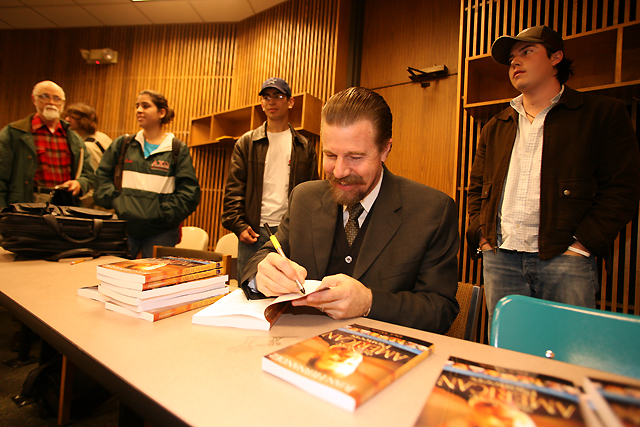Advocate for Rights of Undocumented Mexican Workers Lectures to Baylor Students

Dr. Juan Hernandez signed copies of his book "The New American Pioneers" at Baylor.
by Julie Carlson, (254) 710-6681
A renowned advocate for the rights of illegal aliens from Mexico kicked off the national tour of his new book, "The New American Pioneers," at Baylor University on Wednesday, Feb. 22. Dr. Juan Hernandez, who headed the Office for Mexicans Abroad and served in President of Mexico Vicente Fox's cabinet, spoke to students taking Dr. Victor Hinojosa's class in the politics and government of Mexico. He later gave a public lecture, took questions from the audience and signed books.
"Dr. Hernandez' remarks were well-received and the students asked him insightful and thoughtful questions and we had a fantastic discussion," Hinojosa said. "It was an honor for me, and an honor for the university, to have him here."
"This is the first presentation of the book. We will officially launch it on March 16 in Washington, D.C.," said the personable Hernandez, who regularly appears on CNN, FOX News and Nightline.
Reading excerpts from his book, Hernandez acknowledged that two strong, opposing voices are addressing the issue illegal immigration. One calls for closing the borders and one advocates legal migration.
"We do have enemies in the United States, but what I try to present in the book is that while the nation has been under attack, not in any case did Mexico have anything to do with it," he said. "As a matter of fact, those terrorists responsible for the attacks on Sept. 11, entered the country legally through Canada. I do understand that we are living in times where many are afraid and are shooting at shadows."
However, Hernandez said the migrants who are crossing the border are looking for work, and that many would prefer a circular migration in which they would work in the U.S. for a time and then return to their homes in Mexico. He cited many proposals in Congress that support granting temporary work permits to migrants who live in the U.S. and affords them full protection and benefits.
"There will be a lot of negotiation on these, but one positive is the Visa offer represents a change in attitude toward the migrant worker. The proposals recognize that these Mexicans are honest people who are working hard for a better life," he said.
U.S. citizens are interested in the issue, Hernandez stated. A recent poll recorded that 76 percent of U.S. citizens favored legalizing undocumented aliens if they meet five criteria: that they have no criminal record; that they are not taking jobs; they they pay social security; they work on their English; and they pay a fine for coming in illegally, he said.
"No matter how you feel about the issue, I would propose that you be vocal about it," he said.
"It was a wonderful experience for my students to hear from someone with personal, first-hand knowledge of the events they are studying this semester," Hinojosa said. "Dr. Hernández participated in Mexico's democratic transition and I was honored to have him address my students. We are studying these issues academically. He lived them. His perspective enriched us all."